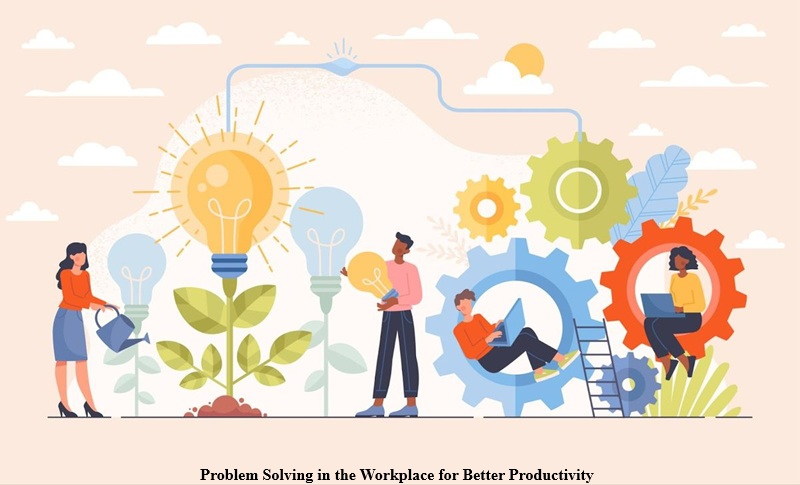Challenges in the workplace are inevitable, but how professionals respond to those challenges defines long-term success. One of the most essential skills to master is problem solving in the workplace. From daily operational issues to larger strategic concerns, problem-solving abilities help maintain productivity, reduce stress, and open opportunities for career growth. Developing this skill not only strengthens individual performance but also supports the overall success of a team or organization.

Why Problem Solving in the Workplace Matters
Modern workplaces demand adaptability. Unexpected issues such as miscommunication, project delays, or sudden changes in client needs often arise without warning. Professionals who excel at problem solving in the workplace can handle these situations with calm and efficiency. Instead of reacting with frustration, they analyze the issue, search for root causes, and propose practical solutions.
Employers also value employees who can think critically and act decisively. Problem solvers stand out because they demonstrate resilience and initiative. These qualities contribute to career advancement, as leaders consistently seek individuals who can resolve conflicts and maintain progress even during difficult times.
Why Are Problem Solvers Important in the Workplace?
Problem-solving skills are a valuable asset that positively impacts both individuals and organizations. A skilled problem solver is able to quickly find the root cause of a problem, thereby reducing wasted time and increasing work efficiency and productivity. Furthermore, this skill also impacts employee morale. Those who can overcome daily challenges feel more empowered, valued, and confident. Recognition for these contributions also increases job satisfaction.
Career-wise, problem solvers are often considered important assets to companies. Their analytical and problem-solving skills open up opportunities for promotions and salary increases, as companies view them as highly valued employees. Furthermore, the ability to solve complex problems helps build a professional reputation. It signals deep competence and expertise in their field, making them a reliable source of trust.
The problem-solving process also hones critical and creative thinking skills. By evaluating situations, analyzing data, and identifying key factors, employees strengthen analytical skills that are crucial in the modern workplace. In short, problem solvers not only solve problems but also create opportunities and long-term added value.
Key Steps in Effective Problem Solving
Problem solving isn’t simply about finding shortcuts. It requires a structured approach to ensure sustainable solutions. The first step is to clearly identify the problem, unambiguously addressing the specific challenges.
Afterward, it’s crucial to analyze the root causes, not just the symptoms, to prevent the problem from recurring. The next step is to brainstorm alternative solutions, providing more options if one approach proves unsuccessful.
From the available options, evaluate and select the best solution, considering factors such as time, cost, and potential impact. The chosen solution needs to be implemented, monitored, and adjusted as needed to achieve the desired results. By following these steps, the problem-solving process can proceed logically, efficiently, and yield long-term results.
Problem Solving as a Collaborative Effort
Although individual initiative is important, collaboration often enhances the problem-solving process. Colleagues from different departments bring unique perspectives, making it easier to uncover creative solutions. Group discussions, brainstorming sessions, and open communication encourage cooperation rather than competition.
Linking Problem Solving to Career Growth
Professionals who demonstrate consistent problem-solving skills often experience faster career growth. Employers recognize that such individuals save time, reduce costs, and maintain workflow efficiency. These qualities are valuable at every level, from entry positions to executive roles.
According to the YouTube channel @vskillscertification on the top 10 ways to increase productivity at the workplace feels practical and effective. By prioritizing tasks, reducing distractions, and taking short breaks, the workflow becomes smoother and less stressful. Integrating tools and technology also makes it easier to stay organized and communicate effectively with colleagues, which directly improves daily performance.
Comparison Problem Solving at the Workplace VS General Advice
Compared to general advice on problem solving in the workplace, the video provides a more structured list of habits that target productivity itself. While problem-solving focuses on resolving specific challenges, these productivity strategies prevent issues from building up, allowing professionals to maintain efficiency and a positive mindset before bigger problems arise.
Practical Tips to Strengthen Problem Solving Skills
Improving problem-solving skills requires consistent practice and the application of effective strategies. One key is remaining calm in stressful situations, as a clear mind leads to better decisions.
Asking questions is also crucial, as curiosity often helps uncover hidden causes of problems. Analytical skills need to be developed by breaking complex problems down into smaller, more manageable parts.
Furthermore, learning from past mistakes provides valuable lessons for facing future challenges. Encouraging a creative mindset is equally important, as unconventional ideas often yield unique solutions.
By adopting these habits, individuals not only improve their personal performance but also positively contribute to team dynamics.
Mastering problem solving in the workplace is one of the most effective ways to boost productivity and advance a career. It helps professionals navigate daily challenges, strengthen collaboration, and build resilience. By developing this essential skill, individuals create opportunities for long-term growth while contributing to organizational success. In the ever-changing professional world, problem-solving ability remains a foundation for both stability and progress. /Wulansa



